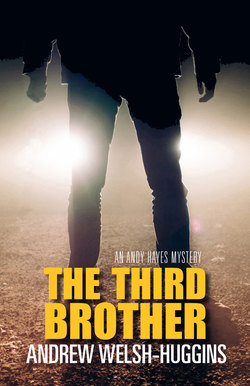Читать книгу The Third Brother - Andrew Welsh-Huggins - Страница 18
На сайте Литреса книга снята с продажи.
Оглавление10
TEN MINUTES LATER I WAS SITTING IN THE parking lot of Masjid Omar, the mosque that Abdi’s family attended off Sunbury Road. I was reviewing the encounter with the agents when I was interrupted by the sound of Tom Petty’s “Free Fallin’” coming from the passenger seat. Caller ID blocked. I answered the phone anyway.
“You’re lucky to be alive.”
“Excuse me?”
“You heard me. Those guys don’t fool around.”
“Who is this?”
“Name’s McQuillen. Thought you could use some help.” His voice low and conspiratorial, like someone passing along a horseracing tip.
“What kind of help?”
“Finding those guys.”
Confused, I thought of the three agents acting as Cindy Morris’s backup band just now. “What guys?”
“The ones in the parking lot who rolled you. I might know who they are. Depending on what you can tell me.”
“And how would you know that?”
“I study guys like them.”
I get this kind of call a lot, which doesn’t make them any less annoying. Most of the time I waste precious minutes explaining why I don’t look for lost cats or collect video evidence of ectoplasmic trails. Usually. I looked out my van window. Abukar Abdulkadir pulled in three spaces away. I waved. He nodded, a look of distraction on his face.
“Back up. Tell me again who you are. And why you’re calling.”
“Told you. Name’s McQuillen. I analyze those people.”
“What people?”
“Right wingers. Hate groups. Citizen militias. Three percenters. The lot.”
“McQuillen your first name or last?”
“Ronald J. McQuillen. Ronald, not Ron.”
“And you analyze these people? Like, as a hobby?”
“I’m a consultant.”
“For who?”
“For people who know less about these groups than me, which is pretty much everyone.”
“Does that include the police?”
“Sometimes.”
“Anybody else?”
“ACLU. Southern Poverty Law Center. Anti-Defamation League. NAACP. Others.” His voice got even lower, as if he’d stepped back into the shadows after spying someone from the state racing board. “I know what I’m doing. I might be able to help you.”
“OK, Ronald J. McQuillen. I’m in the middle of something right now. Any chance I could call you back?”
“I’ll text you my address. Come by and we’ll talk. Just not before ten. I’m usually not up. And not after two or three in the afternoon. I’m working.”
“Where do you live?”
“Watch yourself, all right? These people are a lot more dangerous than you think.”
“But—”
It was too late. He’d hung up. Which also happens to me a lot.
THE MOSQUE WAS A cement-block building painted a drab green, with a basketball court on one side and a small playground of slides and climbing structures on the other. A tall chain-link fence ran around the perimeter, concluding with a rolling gate at the entrance, which had been open when I pulled in. Inside, I followed Abdulkadir’s lead and slipped off my shoes, grateful that I was wearing matching socks for a change. I placed my shoes in a cubbyhole built into a set of floor-to-ceiling white shelves, where they joined a few other pairs.
A young man introduced as Sammy, the mosque youth coordinator, gave me a tour. It didn’t last long. The carpeted prayer room looked to have capacity for a couple of hundred worshippers. You could tell the community had worked hard to create a functional sanctuary, installing wood wainscoting around the room and painting the cinderblock walls a slightly less drab olive than the outer walls, but it didn’t take a lot of imagination to see it as its former incarnation: a central warehouse storage area filled with whatever equipment had once been housed here. A kitchen opened up to the right and classrooms ran down a hall next to it. On the other side of the prayer hall was a recreation area with some workout equipment. An electronic sign by the entrance noted the upcoming prayer times.
The tour finished, we walked back to the front of the mosque and sat around a table in a conference room whose walls were lined with explanatory posters about Islam and travelogue images of a pristine and no doubt long-ago Mogadishu. Abdulkadir served me coffee in a paper cup from a drip machine sitting atop a dented file cabinet in the corner. Settled, I was introduced to the imam, a man whose gray hair partially covered by a prayer cap put him in his late sixties or seventies. He nodded, glance lingering on my black eye.
“Thank you for meeting with me,” I said, after Abdulkadir made the introductions. His suit and tie set him apart from Sammy and the imam, who both wore robes. Abdulkadir smiled as I spoke, though it seemed like he was making an effort to stay positive. I explained who I was and why I was there, knowing full well I was giving them information they already had. “Do you have any idea where Abdi could be?” I said, ending my short speech.
Sammy glanced at the imam before responding. “Aren’t you going to ask if we think he was radicalized?”
“I guess not. Should I?”
“That’s what the FBI wants to know.”
“And for good reason, don’t you think? But I was hired to find him, not figure out his theology. If you think that will help me, then tell me by all means. Otherwise, it doesn’t matter one way or the other. Does it?”
Abdulkadir roused himself and stared at me like a man who’s brought himself up short just inches from the edge of a cliff. “Of course it does, Andy Hayes,” he said. “It matters most of all.”
